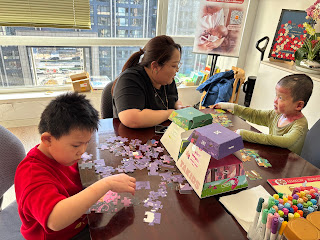When we think about child development, it is often the major milestones that come to mind, like first steps, first words, first day of preschool.
However, the seemingly trivial everyday moments play an even more central role in shaping who a child is and who they become. We believe that everyday life matters, for example, family life, school, and extracurricular activities create abundant opportunities for the child’s socialization process and the development of higher psychological functions, such as problem solving and self-regulation.
When a child helps prepare dinner, they practice fine motor skills, following instructions, time management, simple math, and teamwork.
Participating in family life, school, and extracurricular activities supports children in their development of language and cognition. For young children, learning begins with concrete and tangible experiences. For example, the water-related activities in our Montessori classroom offers children abundant opportunities to experiment with abstract concepts like sinking and floating. A trip to the supermarket or grocery store is ideal for learning names of ingredients, colors, and quantity, and for having conversations about meal planning and nutrition.
For our children, important adults in their lives (nannies, group home parents, and teachers) also play a critical role in shaping their emotional stability, social skills, and overall psychological well-being. An adult who responds instantaneously to a little one’s physical or emotional needs, who engages in play and storytelling, who comforts when the child feels hurt, help maintain trust and a sense of security. When an adult models communication, calmness, and empathy, the child learns how to express emotions and build relationships.
Everyday life provides a rich setting for social and cultural awareness. A child’s sense of culture and society develops through simple activities—sharing a meal around a round table with family, offering tea with respect when guests visit, and visiting famous historical places. When children celebrate Chinese New Year with red lanterns, red envelopes from older generation, and dumpling-making and eating as a family, they learn, in a sensory-rich and tangible way, about traditions, values, and ways of thinking. Experiences like these shapes their cultural identity and a sense of belonging.
It is the everyday routines, interactions, and relationships that shape a child’s development. Children are constantly learning, growing, and absorbing what is available in their near environment. In this process, they form their sense of self. By creating a rich and supportive environment, we want to ensure that every child has the opportunity to thrive, regardless of their background.

















